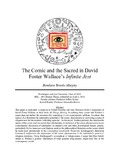The Comic and the Sacred in David Foster Wallace's Infinite Jest (thesis)

View/
Author
Murphy, Bendann B.
Subject
Washington and Lee University -- Honors in Religion
Wallace, David Foster
Religiousness in literature
Wit and humor -- Religious aspects
Metadata
Show full item recordDescription
Thesis; [FULL-TEXT FREELY AVAILABLE ONLINE] Bendann B. (Ben) Murphy is a member of the Class of 2018 of Washington and Lee University. This paper is motivated in response to Hubert Dreyfus and Sean Dorrance Kelly's exposition of David Foster Wallace in their book All Things Shining. In refuting their claims that Wallace's canon does not harbor the resources for responding to our contemporary nihilism, I contend that Infinite Jest illustrates the redemptive potential of the comic phenomenon in recovering a sense of religiousness for the modern ‘unwilling agnostic.' In the novel, Wallace portrays the inextricable nature of the comic and the sacred that substantiates an inclusion of the comic phenomenon in any contemporary discussion of spirituality. In chapter's two and three, Kierkegaard figures greatly, particularly for his immense contributions made to the philosophical literature on the comic which he made most prominently in the Concluding Unscientific Postscript. Kierkegaard's dialectical framework emphasizes the importance of the comic phenomenon in the individual's pursuit of religious existence. Using Kierkegaard's conceptions of religiousness, I argue that Don Gately stands as Wallace's greatest illustration of what genuine religiousness might look like in the contemporary world.